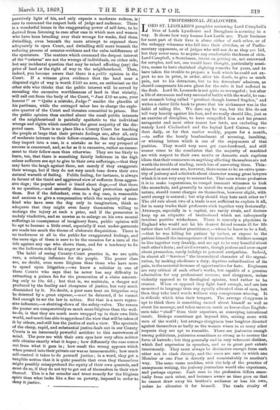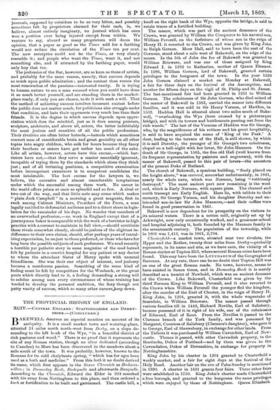PROFESSIONAL JEALOUSIES.
LORD ST. LEONARD'S pamphlet reviewing Lord Campbell's lives of Lords Lyndhurst and Brougham is amusing in a way. It shows how very human Law Lords are. Their business for most part of their lives is abuse either of each other, or of the unhappy witnesses who fall into their clutches, or of Parliamentary opponents, or of judges who will not do as they are bid, but they never seem to acquire any comfortable thickness of skin.
Lord Campbell, a Scotchman, intent on getting on, not renowned
for scruples, and not, one would have thought, particularly sensitive, seems to have cherished slighting remarks for years, and to have taken the trouble to prepare a book which he could not expect to see in print, in order, after his death, to give as much pain, not to his detractors, but to his detractors' admirers, as should compensate his own ghost for the rubs it had suffered in the flesh. Lord St. Leonards is not quite so revengeful ; but after a life of strenuous and very successful battle with the world, he cannot stomach being called "petulant though learned Sugden," and writes a clever little book to prove that his nicknatuer was in the habit of telling fibs. We dare say he was, but the fibs do not tell very heavily against his foes, and we really should like, just as an exercise of discipline, to have compelled him and his present antagonist and most other recent law lords, not excluding the stately Lord Chelmsford and the logical Lord Cairns, to conduct daily, or for that matter weekly, papers for a month, —to suffer the hourly bombardment of accusing, insulting, or whining letters which is one of the enjoyments of that position. They would very soon get case-hardened, and still sooner come to the conclusion that the majority of mankind are with respect to their own merits or demerits such captious idiots that their comments on anything affecting themselves are not worth the trouble of reading, much less of answering theta. Thinskinned as most men are, however, there seems to be an extra quantity of jealousy and solicitude about character among great lawyers which it is not very easy to account for. That men whose profession it is to make imputations, to compel innocent witnesses to look like scoundrels, and generally to unveil the weak places of human nature, should resent charges on themselves, however slight, with acrid energy is natural ; but why should they hate each other so ? The old rule about two of a trade is not sufficient to explain it all, for in many trades their professors stick together very fraternally. Attorneys, especially in a capital, arc rarely rivals, and doctors keep up an etiquette of brotherhood which not infrequently involves positive wickedness. There is scarcely a physician in England who would not lot his dearest friend remain ill for life rather than tell another practitioner,—whom he knew to be a fool, —that he was killing his patient by inches, or expose to the patient himself the incompetence of his attendant. Soldiers manage to live together very frankly, and are apt to be very boastful about each other's feats ; and civil servants, though jealous and over-eager about promotion, rarely indulge in personal antipathies. Indeed, in almost all " Services " the hierarchical character of the organization, by making obedience a duty, deprives subordination of its pain, to the material decrease of opportunities for hate. Engineers are very critical of each other's works, but capable of a genuine admiration for any professional success ; and clergymen, unless violently opposed as to theological opinion, tend rather to be cronies. When so opposed they fight hard enough, and are leas measured in language than any equally educated class of men, but then they take hard words without very conspicuous wincing. It is ridicule which tries their tempers. The average clergyman is apt to think there is something sacred about himself as well as about his message, and takes sanest:1 much as lower-class Englishmen take " chaff" from their superiors, as conveying intentional insult. Bishops sometimes get beyond this, mixing more with men of the world ; but average clergymen bear laughter directed against themselves as badly 88 the women whom in so many other respects they are apt to resemble. There are jealousies enough among politicians, jealousies sometimes so strong as to assume the form of hatreds ; but they generally end in very vehement dislikes,
which find expression in speeches, and so in great part exhale innocuously. They must always be distinctive enough from each other not to clash directly, and the cases are rare in which one Member or one Peer is directly and unmistakably in another's way. The same cause modifies, with the help of the practice of anonymous writing, the jealousy journalists would else experience, and perhaps express. Each man in the profession differs essentially from each other, and becomes aware as time goes on that he cannot draw away his brother's audience or lose his own, unless he alienates it for himself. The trade rivalry of journals, supposed by outsiders to be so very bitter, and possibly sometimes felt by proprietors alarmed for their cash, is, we believe, almost entirely imaginary, no journal which has once won a position ever being injured except from within. We venture to say, absurd as many proprietors will deem the opinion, that a paper as good as the Times sold for a farthing would not reduce the circulation of the Times ten per cent. The new enterprise could not be the Times, or very closely resemble it ; and people who want the Times, want it, and not something else, and if attracted by the farthing paper, would only buy that too.
The jealousies of the Bar, however, are as keen as those of artists, and probably for the same reason, namely, that success depends so much upon public admiration ; and the contest thus rouses the most remorseless of the passions—interested vanity. It is trying to human nature to see a man succeed when you could have done it so much better yourself, and are standing there in the marketplace ready, if only you are chosen, to do it with such a will. That the method of achieving success involves incessant contest before the public does not matter much, for politicians also struggle under that condition, and hate their opponents very much less than their friends. It is the degree in which success depends upon appreciation which does the mischief, just as it does among painters, sculptors, architects, and above all, actors, the latter indubitably the most jealous and sensitive of all the public professions. Their rivalries are often bitter hatreds,—hatreds which sometimes convert men of considerable brain and great geniality on all other topics into angry children, who sulk for hours because they fancy their brothers or sisters have got rather too much of the cake. Like all artists, however, actors have this excuse,—which barristers have not,—that they serve a master essentially ignorant, incapable of trying them by the standards which alone they think just ; and of all irritating positions, a competitive examination before incompetent examiners is to competent candidates the most intolerable. The best excuse for the lawyers is, we believe, the excessive and almost unendurable temptations under which the successful among them work. No career in the world offers prizes at once so splendid and so few. A rival or two out of the way, and that little note may come which makes "plain Jock Campbell" in a morning a great magnate, first in rank among Cabinet Ministers, President of the Peers, a man legally entitled to deferential audience and to a direct share in legislation for the remainder of his days. No wonder that members of an overworked profession,—no work in England except that of a journeyman baker is comparable with the work of a barrister in high practice with a coronet to maintain in full view,—should scrutinize those rivals somewhat closely, should be jealous of the slightest indifference to their own claims, should, after perhaps years of tantalizing expectation, be unjust to those preferred, or those who have for long been the possible subjects of such preference. We read recently a horrible yet pathetic story in some magazine of the mad hatred felt by patients in a convict hospital for any patient or any doctor to whom the attendant Sister of Mercy spoke with unusual friendliness. She was their one object of interest, and jealousy became a murderous passion. Something of the same kind of feeling must be felt by competitors for the Woolsack, or the great posts which directly lead to it, a feeling demanding a strong will to subdue among men every circumstance of whose training has tended to develop the personal ambition, the fiery though not petty vanity of success, which so many other careersjceep down.



































 Previous page
Previous page